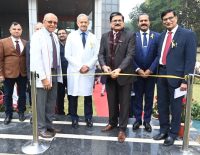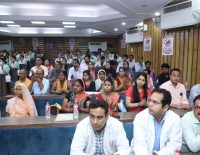Cashless treatment starts at AIIMS Delhi

The cashless treatment facilities will now be available to the both serving and pensioners CGHS beneficiaries at AIIMS New Delhi, PGIMER Chandigarh, and JIPMER Puducherry. The Memorandum of Agreement to this effect was signed on Tuesday between the three medical institutions- AIIMS, New Delhi, PGIMER, Chandigarh, and JIPMER, Puducherry, and CGHS, Ministry of Health.
The initiative builds upon the six previously signed MoAs between CGHS and other All India Institute of Medical Sciences (AIIMS) located in Bhopal, Bhubaneswar, Patna, Jodhpur, Raipur, and Rishikesh.
“The extension of patient care facilities at AIIMS New Delhi, PGIMER Chandigarh, and JIPMER Puducherry to CGHS beneficiaries on a cashless basis will be particularly beneficial for pensioner beneficiaries of CGHS. It eliminates the need for them to submit individual reimbursement claims and follow up for approvals”, said Health Secretary Rajesh Bhushan.
Mr Bhushan further emphasized that this agreement will benefit a large segment of the population by simplifying lengthy formalities and expediting access to medical care. He also noted that this agreement will help expand the reach of CGHS services across the nation, allowing beneficiaries to avail CGHS facilities at the INIs institutions in their respective states.
“CGHS beneficiaries will have direct access to state-of-the-art treatment facilities available in these medical institutions, without the hassle of making upfront payments and seeking reimbursements from CGHS. This streamlined process will save time, reduce paperwork, and expedite the settlement of individual claims’, he added.
Under the initiative, the cashless treatment will be available in outpatient departments (OPD), investigations, and indoor treatment for CGHS pensioners and other eligible categories of beneficiaries. The three institutions will raise credit bills for CGHS pensioners and other eligible beneficiaries, and CGHS will preferably make payment within 30 days of receiving the bills.
The CGHS beneficiaries will be admitted only upon the production of a valid CGHS Beneficiary ID Card for treatment at these institutions. The medicines prescribed by the doctors at these institutions, whether for OPD treatment or at the time of discharge, will be collected by beneficiaries through CGHS.








Comments